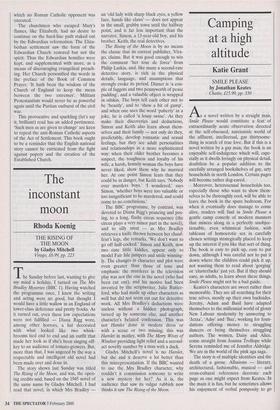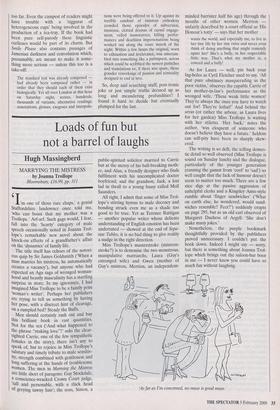Camping at a high altitude
Katie Grant
SMILE PLEASE by Jonathan Keates Chatto, £15.99, pp. 330 Aa novel written by a straight man, Smile Please would constitute a feat of extraordinarily acute observation directed at the self-obsessed, narcissistic world of the affluent, intellectual, gay thirtysome- thing in search of true love. But if this is a novel written by a gay man, the book is an enjoyable self-indulgence which will, espe- cially as it dwells lovingly on physical detail, doubtless be a popular addition to the carefully arranged bookshelves of gay, arty households in north London. Certain pages will become rather dog-eared.
Moreover, heterosexual households too, especially those who want to show them- selves to be thoroughly cool, will be able to leave the book in the spare bedroom. For when it eventually does manage to come alive, readers will find in Smile Please a gentle camp comedy of modern manners that minces along in a perfectly unobjec- tionable, even whimsical fashion, with tableaux of homoerotic sex in carefully chosen settings strategically placed to keep up the interest if you like that sort of thing. The book is easy to pick up, easy to put down, although I was careful not to put it down where the children could pick it up, not wanting them to read about 'gorging' or 'clusterfucks' just yet. But if they should care, as adults, to learn about these things, Smile Please might not be a bad guide.
Keates's characters are sweet rather than memorable. They are all searching for their true selves, mostly up their own backsides. Jeremy, Adam and Basil have adapted themselves to the millennial world of glossy New Labour modernity by answering to 'Jezza', `Adsy' and `Baz', working for foun- dations offering money to struggling dancers or being themselves struggling authors. The women, Daisy and Alice, come straight from Joanna Trollope while Serena reminded me of Jennifer Aldridge. We are in the world of the pink aga saga.
The story is of multiple identities and the death of a goose. Allusions — literary, architectural, fashionable, musical — and cross-cultural references decorate each page as one might expect from Keates. In the main it is fun, but he sometimes allows his enjoyment of verbal pomposity to go too far. Even the campest of readers might have trouble with a 'ziggurat of heterogeneous cups' being involved in the production of a tea-tray. If the book had been pure self-parody these linguistic curlicues would be part of its charm. But Smile Please also contains passages of Jamesian darkness and convolution which, presumably, are meant to make it some- thing more serious — unless this too is a take-off:
The standard text was already composed — had already been composed rather — in order that they should each of them exist biologically. Yet all over London at this hour on Saturday night, scores, hundreds, thousands of variants, alternative readings, annotations, glosses, exegeses and interpola- tions were being offered to it. Up against its terrible candour of insistent orthodoxy crowded those episodes of subversion, immense, clotted dramas of carnal engage- ment, veiled manoeuvres, killing perfor- mances and deathless impersonations being worked out along the route march of the night. Within a few hours the original, worn to exhaustion and irrelevance, was unscram- bled into something like a palimpsest, across which could be scribbled the newest pastiches and translations or, if there was space, those grander reworkings of passion and sensuality designed to end in love.
So, deep and searching stuff, post-ironic joke or just simple truths dressed up as long and meandering profundities? I found it hard to decide but eventually plumped for the last.



























































 Previous page
Previous page